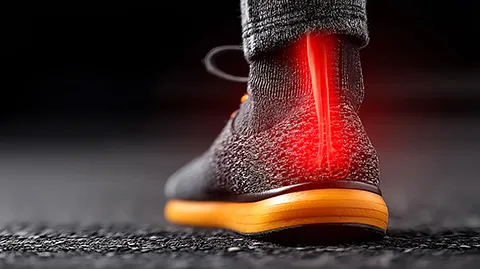
Understanding Achilles Tendinitis: Symptoms, Causes & Treatment

The Achilles tendon is the largest tendon in the body, connecting the calf muscles to the heel bone. It plays a crucial role in walking, running, and jumping. Repetitive stress or sudden increases in activity can lead to Achilles tendinitis, a painful condition characterized by inflammation and irritation of the tendon.
This condition commonly affects runners, athletes, and individuals who suddenly increase their physical activity. Without proper treatment, Achilles tendinitis can lead to chronic pain or even tendon rupture, requiring surgical intervention.
Common symptoms of Achilles tendinitis include:
- Gradual pain & stiffness along the back of the heel, especially in the morning
- Increased pain during or after physical activity
- Tenderness & swelling along the Achilles tendon
- Difficulty pushing off the foot while walking or running
Common risk factors of Achilles tendinitis include:
- Overuse: Frequent running, jumping, or high-impact activities.
- Sudden Increase in Activity: A rapid boost in exercise intensity elevates your risk, such as increasing running distance too quickly.
- Tight Calf Muscles: Limited flexibility in the lower leg can increase stress on the Achilles tendon.
- Improper Footwear: Worn-out shoes or those lacking proper support can contribute to tendon strain and lead to this condition.
- Flat Feet or High Arches: These foot structures can increase strain on the Achilles tendon.
Treatment & Prevention
Most cases of Achilles tendinitis improve with conservative treatments aimed at reducing inflammation, promoting healing, and strengthening the tendon to prevent recurrence. Conservative treatment options for Achilles tendinitis include:
- Rest & activity modification
- Ice therapy
- Stretching & strengthening exercises
- Proper footwear & orthotics
- Physical therapy
- Anti-inflammatory medications
Taking steps to prevent Achilles tendinitis can help avoid pain and long recovery periods. Whether you’re an athlete or someone who enjoys staying active, these simple strategies can reduce your risk:
- Gradually increase physical activity levels
- Incorporate proper warm-ups and stretching before exercise
- Wear appropriate shoes
- Listen to your body and avoid overtraining
If Achilles pain is keeping you off your feet, early intervention is key. Our foot and ankle doctors at Orthopedic Associates are here to help. Please call us at (314) 569-0612 or request an appointment online to get your strength back in your feet.

